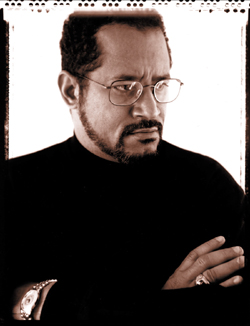I’m so happy Kanye beat 50 Cent, I don’t know what to do,” said Dr. Michael Eric Dyson to a packed house at MTSU’s Alumni Memorial Gym.
This statement, referring to sales results of the two artists’ competing albums, seemed to epitomize Dyson’s speech, unloaded more as a performance than any sort of dull classroom lecture.
With a rhythm typically reserved for musicians, Dyson dissected the hip-hop community in a speech delivered on Oct. 31 as part of MTSU’s Conference on Cultural Diversity.
“50 Cent [the standard gangsta rapper], justified George Bush and defended his actions during Hurricane Katrina,” Dyson said. “And Kanye West stood up against the most powerful man in the world. You tell me who is more gangsta.”
From here, Dyson, an author of 14 books and professor at Georgetown University, moved onto gender inequalities, using Soulja Boy’s hit, “Crank Dat,” focusing on the song’s infamous lyric, superman dat hoe.
Let us do a Bachian analysis. Let us do a Derridian deconstruction . . . When you say Superman that hoe, does that imply that when a woman has the self-respect to deny your advances, that when she is sleeping you should ejaculate on her back and spread the sperm around so that, when she stands up in the morning, the sheet is stuck to her back so that she looks like superman?
This reporter, ever diligent in his practice of verification, confirmed this on urbandictionary.com.
“And you ladies are dancing to that shit?” Dyson asked.
Dyson explained the art form of hip-hop has been “an African-American institution” for 25 years now, and, throughout that time, has evolved in many different ways.
“Where young black Americans once turned primarily to the church—and to the civil rights leaders that the church produced—to articulate their hopes, frustrations and daily tribulations, it is fast becoming men like Jay-Z and Nas, and women like Missy Elliot and Lauryn Hill, who best vocalize the struggle of growing up black and poor in this country,” Dyson writes in his latest book, Know What I Mean?
Elaborating on these ideas, Dyson expanded his argument to include everyone, regardless of race, religion, region, sex or sexual orientation.
In his years as a Baptist minister, Dyson began speaking out on giving women leadership positions in the church as early as 1983.
“I backed up my arguments with passages from the Bible,” he explained.
However, another church got wind of what he was doing and spoke out against what Dyson was trying to implement.
“I got to the church and [the congregation] said there was a problem,” Dyson added. “I asked them what it was and they said ‘The problem is you.’”
Rounding out his all-encompassing view on equality and diversity, Dyson also spoke on his distaste for homophobia.
“I do not understand black people who, after all of the civil rights movements that got them to where they are today, can stand around and say ‘I’m against gay marriage,’” Dyson said.













